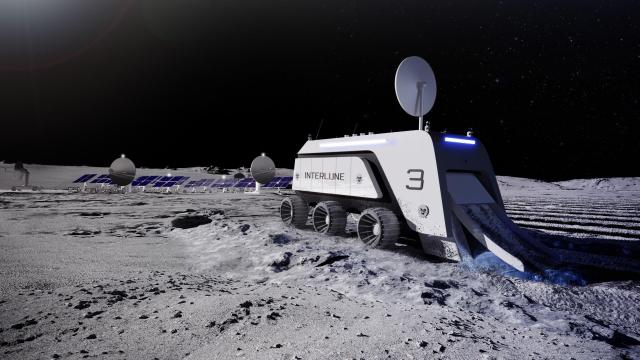Over billions of years, the surface of the Moon has been bombarded by solar wind, carrying high-energy particles that include a highly coveted resource, helium-3. Although the element is scarce on Earth, it has recently become in demand by several industries, including those working on quantum computing and nuclear fusion reactors.
Helium-3 has been deemed so precious that one company is willing to go all the way to the Moon to get it. Seattle-based startup Interlune recently announced that it raised $US15 million in funding as part of its plan to harvest and sell natural resources from the Moon. The company wants to initially focus on harvesting helium-3, which it can sell to government and commercial customers in the national security, quantum computing, medical imaging, and fusion energy industries, according to Interlune.
“There is growing demand for Helium-3 across burgeoning and potentially massive industries,” Alexis Ohanian, one of the main investors in Interlune’s latest round of funding, said in a statement. “We invested in Interlune because access to the ample cache of Helium-3 and other precious natural resources on the Moon and beyond will unlock or accelerate technological advancements currently hindered by lack of supply.”
Interlune was founded in 2020 by former Blue Origin President Rob Meyerson and former Chief Architect Gary Lai, as well as Harrison Schmitt, the only living member of Apollo 17—NASA’s last crewed mission to the Moon. “For the first time in history, harvesting natural resources from the Moon is technologically and economically feasible,” Meyerson said in a statement.
Sure it’s feasible, but the company still needs to develop a way to do it. The latest round of funding is a good start, but there’s still a long way to go. Interlune is working on the design of its first robotic lander mission, which will verify the helium-3 levels at the company’s chosen Moon site for its initial operation.
Although it’s still in its initial phases, Interlune is hoping to launch a new era for the lunar economy, essentially becoming the first to harvest and sell natural resources extracted from the Moon. According to the Space Resource Exploration and Utilization Act, which was passed in 2015, any resource obtained in space is the property of the entity that extracted it.
The idea of resource mining from the Moon and other celestial objects has been floating around for some time, but very few companies have made any substantial steps towards achieving it. NASA recently announced its own plans to explore harvesting resources from the Moon within the next 10 years to support its Artemis plans, hoping to establish large scale lunar regolith mining by 2032 and extracting resources such as water, iron, and rare metals.
Space definitely has all the right stuff, but there’s still a lot of groundwork that needs to be done before we can start selling cosmic resources. Since there are no regulations set in place as of yet, there’s also an added risk of the race to extract as much resources as possible, altering the makeup of the Moon or other objects in space.
